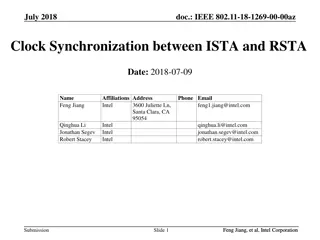
Understanding Processor Locking Mechanisms in Operating Systems
Explore the intricate world of processor locking mechanisms in operating systems through slides showcasing code snippets and explanations. Learn about key concepts like thread scheduling, mutex usage, spinlocks, and benchmark execution. Uncover the logic behind while loops, if conditions, and memory loading techniques. Gain insights into processor lock acquisition and release processes.
Download Presentation

Please find below an Image/Link to download the presentation.
The content on the website is provided AS IS for your information and personal use only. It may not be sold, licensed, or shared on other websites without obtaining consent from the author. If you encounter any issues during the download, it is possible that the publisher has removed the file from their server.
You are allowed to download the files provided on this website for personal or commercial use, subject to the condition that they are used lawfully. All files are the property of their respective owners.
The content on the website is provided AS IS for your information and personal use only. It may not be sold, licensed, or shared on other websites without obtaining consent from the author.
E N D
Presentation Transcript
- - -
while (condition X not true) {} logic that assumes X is true
if (condition X not true) block until true; // OS scheduler de-schedules thread // (lets another thread use the processor) pthread_mutex_t mutex; pthread_mutex_lock(&mutex);
lock: ld R0, mem[addr] // load word into R0 cmp R0, #0 // compare R0 to 0 bnz lock // if nonzero jump to top st mem[addr], #1 // Set lock to 1 unlock: st mem[addr], #0 // store 0 to address
ts R0, mem[addr] // load mem[addr] into R0 // if mem[addr] is 0, set mem[addr] to 1 lock: ts R0, mem[addr] // load word into R0 bnz R0, lock // if 0, lock obtained unlock: st mem[addr], #0 // store 0 to address
Benchmark executes: lock(L); critical-section(c) unlock(L);
void Lock(volatile int* lock) { while (1) { // while another processor has the lock... while (*lock != 0); // when lock is released, try to acquire it if (test_and_set(lock) == 0) return; } } void Unlock(volatile int* lock) { *lock = 0; }
void Lock(volatile int* lock) { int amount = 1; while (1) { if (test_and_set(lock) == 0) return; delay(amount); amount *= 2; } } -
volatile int sum; int A[n]; lock mutex; for (int i = 0; i < n/nthread; i++) { lock(&mutex); sum += A[i + myid*n/nthread]; unlock(&mutex); } for (int i = 0; i < n/nthread; i++) atomic_increment(&sum, A[i + myid*nthread]);
type __sync_fetch_and_add (type *ptr, type value) type __sync_add_and_fetch (type *ptr, type value) int fadd(int *loc, int val) { return __sync_fetch_and_add(loc, val); } 0000000000000000 <fadd>: 0: 89 f0 mov 2: f0 0f c1 07 lock xadd %eax,(%rdi) 6: c3 retq %esi,%eax
struct lock { volatile int next_ticket; volatile int now_serving; }; void Lock(lock* lock) { int my_ticket = atomic_increment(&lock->next_ticket); // take a ticket while (my_ticket != lock->now_serving); // wait for number } // to be called void unlock(lock* lock) { lock->now_serving++; }
struct lock { volatile int status[PMAX][W]; // padded to keep off same cache line volatile int head; }; int my_element; void Lock(lock* lock) { my_element = atomic_increment(&lock->head); while (lock->status[my_element % PMAX][0] == 1); } void unlock(lock* lock) { lock->status[my_element % PMAX][0] = 1; lock->status[(my_element+1) % PMAX][0] = 0; }
struct Barrier_t { LOCK lock; int counter; // initialize to 0 int flag; // the flag field should probably be padded to // sit on its own cache line. Why? }; // barrier for P threads void Barrier(Barrier_t* b, int P) { lock(b->lock); if (b->counter == 0) { b->flag = 0; // first thread arriving at barrier clears flag } int num_arrived = ++(b->counter); unlock(b->lock); if (num_arrived == P) { // last arriver sets flag b->counter = 0; b->flag = 1; } else { while (b->flag == 0); // wait for flag } do stuff ... Barrier(b, P); do more stuff ... Barrier(b, P); }
struct Barrier_t { LOCK lock; int arrive_counter; // initialize to 0 (number of threads that have arrived) int leave_counter; // initialize to P (number of threads that have left barrier) int flag; }; // barrier for P threads void Barrier(Barrier_t* b, int P) { lock(b->lock); if (b->arrive_counter == 0) { // if first to arrive... if (b->leave_counter == P) { // check to make sure no other threads still in barrier b->flag = 0; // first arriving thread clears flag } else { unlock(lock); while (b->leave_counter != P); // wait for all threads to leave before clearing lock(lock); b->flag = 0; // first arriving thread clears flag (How many can do this?) } } int num_arrived = ++(b->arrive_counter); unlock(b->lock); if (num_arrived == P) { // last arriver sets flag b->arrive_counter = 0; b->leave_counter = 1; b->flag = 1; } else { while (b->flag == 0); // wait for flag lock(b->lock); b->leave_counter++; unlock(b->lock); } }
struct Barrier_t { LOCK lock; int counter; // initialize to 0 int flag; // initialize to 0 }; int local_sense = 0; // private per processor. Main idea: processors wait for flag // to be equal to local sense // barrier for P threads void Barrier(Barrier_t* b, int P) { local_sense = (local_sense == 0) ? 1 : 0; lock(b->lock); int num_arrived = ++(b->counter); if (b->counter == P) { // last arriver sets flag unlock(b->lock); b->counter = 0; b->flag = local_sense; } else { unlock(b->lock); while (b->flag != local_sense); // wait for flag }
atomic { // begin transaction perform atomic computation here ... } // end transaction






















